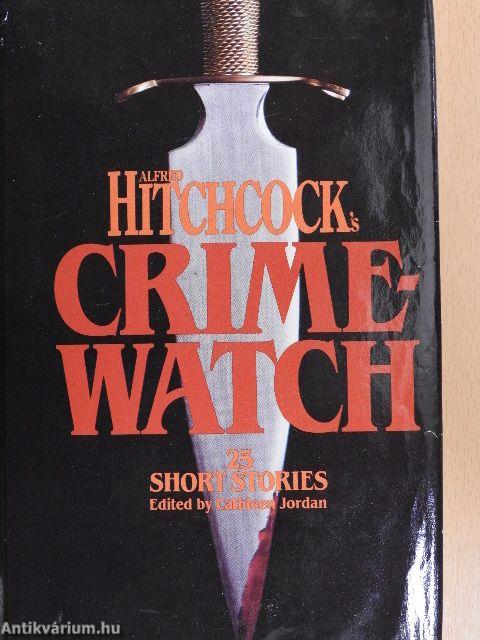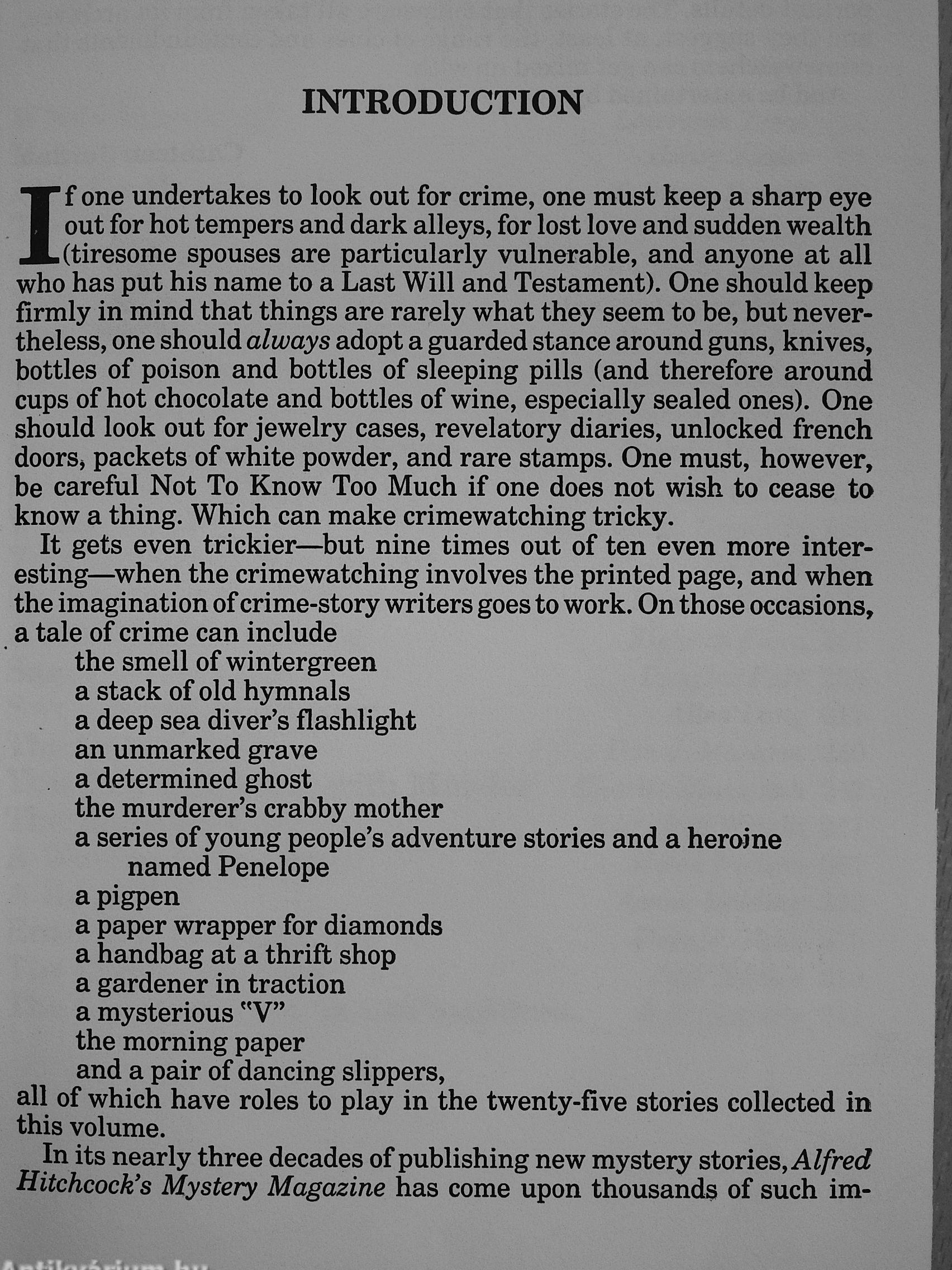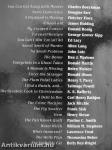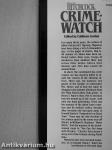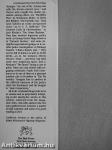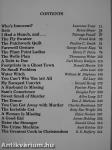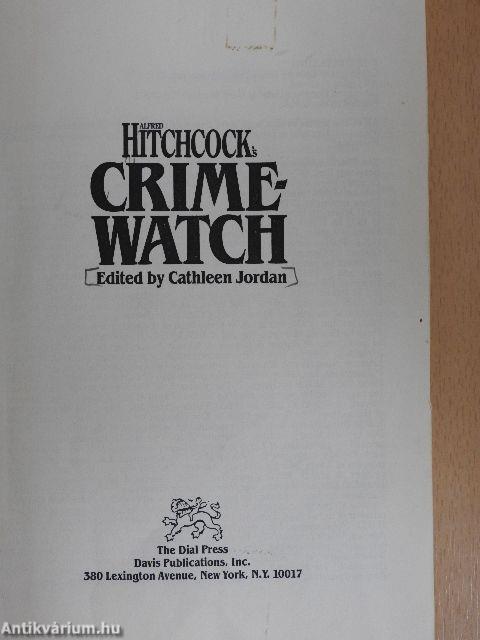1.067.339
kiadvánnyal nyújtjuk Magyarország legnagyobb antikvár könyv-kínálatát

VISSZA
A TETEJÉRE
JAVASLATOKÉszre-
vételek
Alfred Hitchcock's Crimewatch
25 Short Stories
| Kiadó: | The Dial Press-David Publications, Inc. |
|---|---|
| Kiadás helye: | New York |
| Kiadás éve: | |
| Kötés típusa: | Fűzött keménykötés |
| Oldalszám: | 348 oldal |
| Sorozatcím: | |
| Kötetszám: | |
| Nyelv: | Angol |
| Méret: | 21 cm x 14 cm |
| ISBN: | |
| Megjegyzés: | További kapcsolódó személyek a könyvben. |
naponta értesítjük a beérkező friss
kiadványokról
naponta értesítjük a beérkező friss
kiadványokról
Előszó
TovábbFülszöveg
You Can Get Away with Nurder Sam's Conscience ¦ A Is \ig
A Good hid Ply Escaped Convict rareweil\Gesture You Can't Win 'Em (at) All Sweet^meli of Plurder No Small Problem
Cficiries Boeckman Douglas Farr ^ riptcher Flora $ James tloiding Donaldv Honig George Grover Kipp Ed Lacy Allen Lang John Lutz
The Donor Dan J. Marlowe
Footprints in a Ghost Toivn A Woman Is I*lissing Enter the Stranger The Plum Ppirif Ladies I flad a Hunch, and The Greatest Cook in Christendom A Debt to Doc The Crime Maclxine The Fly Swatter Item,
The Patchwork Quilt
Who's innocent?
The Wells Plan The Invisible Cat
Donald Martini
Helen r" '-^en Donald Oisun Henry T. Parry Talmage P S. S. Rafferty Carl Henry Jack Ritchie . FrankSisk Henry Slesar Pauline C. Süsii^h William M. Stephens Lawrence Treat Thomdsina Weber Betty Ren Wright
HicHCoa
CRIME-
mscn
Edited by Cathleen Jordan
Por nearly thirty years, the editors of Alfred Hitchcock's Mystery Magazine have been doing a lot of crimewatch-ing—in the... Tovább
Fülszöveg
You Can Get Away with Nurder Sam's Conscience ¦ A Is \ig
A Good hid Ply Escaped Convict rareweil\Gesture You Can't Win 'Em (at) All Sweet^meli of Plurder No Small Problem
Cficiries Boeckman Douglas Farr ^ riptcher Flora $ James tloiding Donaldv Honig George Grover Kipp Ed Lacy Allen Lang John Lutz
The Donor Dan J. Marlowe
Footprints in a Ghost Toivn A Woman Is I*lissing Enter the Stranger The Plum Ppirif Ladies I flad a Hunch, and The Greatest Cook in Christendom A Debt to Doc The Crime Maclxine The Fly Swatter Item,
The Patchwork Quilt
Who's innocent?
The Wells Plan The Invisible Cat
Donald Martini
Helen r" '-^en Donald Oisun Henry T. Parry Talmage P S. S. Rafferty Carl Henry Jack Ritchie . FrankSisk Henry Slesar Pauline C. Süsii^h William M. Stephens Lawrence Treat Thomdsina Weber Betty Ren Wright
HicHCoa
CRIME-
mscn
Edited by Cathleen Jordan
Por nearly thirty years, the editors of Alfred Hitchcock's Mystery Magazine have been doing a lot of crimewatch-ing—in the pages of stories, that is. All manner of crimes have been unfolded before their eyes; troops of murderers have skulked their way across their desks; knives have flashed, and .38's have roared all around them.
In short, the excitement has never ceased, nor has mystery failed to invade the comers of the editorial offices. There was, for instance, the puzzle of the murder of aristocratic Mrs. Himer, and of how she came to disappear one summer afternoon from the Plum Point Ladies Club picnic, in Henry T. Parry's story Not to mention how she wound up in the ocean, with only one hand protruding. There was the mystery of the ghost town cemetery and its solitary visitor, decades after everyone else had gone away in Donald Martin's "Footprints in a Ghost Town." There was the odd incident of the sunken yacht in the sunny seas off Bimini, in William M, Stephens' "Water Witch." And the mystery of the bloodstained room in "You Can Get Away with Murder," Charles Boeckman's story set in Mew Orleans during Mardi Gras.
Mysteries have even involved mysteries, as in Donald Olson's "Enter the (continued on the back flap)
27995
(continued from the front flap) Stranger," the tale of his "young man with the dream-scarred eyes," and they've also caught the reader unawares: among others, see "The^ells Plan" by Thomasina Weber, or Betty Ren Wright's "The Invisible Cat." They have handed us some unexpected clues—as in S. S. Rafferty's "The Greatest Cook in Christendom," or Jack Ritchie's "The Crime Macjiine." They have involved ingenious police work, as George Grover Kipp shows us in "Farewell Gesture," and some delightful supernatural goings-on in another police investigation, in Talmage Powell's "1 Had a Hunch, and " They can be full of humor as well as of fell deeds—as in, for instance, Henry Slesar's "Item"—and they can take some very surprising turns, Dan J. Marlowe's "The Donor" being a case in point. There are even stories with engaging criminals; Frank Sisk introduces us to one of them at a pleasant outdoor cafe in Portofino in "The Fly Swatter," Douglas Farr to another in the difficult business of the police chief, the lieutenant, and the burglar in "Sam's Conscience."
All in all, crimewatching tends to be as various and as perpetually intriguing as the twenty-five stories in this volume, collected from the magazine's files. And with authors like the ones gathered here involved, a matter of high suspense and some very good reading as well.
Cathleen Jordan is the editor of Alfred Hitchcock's Mystery Magazine.
The Dial Press 243 Park Avenue New York, N.Y. 10167 Printed in the U.S.A. Vissza
Témakörök
- Idegennyelv > Idegennyelvű könyvek > Angol > Szépirodalom > Antológia
- Idegennyelv > Idegennyelvű könyvek > Angol > Szépirodalom > Regény, novella, elbeszélés
- Idegennyelv > Idegennyelvű könyvek > Angol > Szépirodalom > Szórakoztató irodalom > Akció, kaland
- Idegennyelv > Idegennyelvű könyvek > Angol > Szépirodalom > Szórakoztató irodalom > Krimi
- Szépirodalom > Regény, novella, elbeszélés > Tartalom szerint > Összegyűjtött novellák
- Szépirodalom > Antológia
- Szépirodalom > Szórakoztató irodalom > Akció, kaland
- Szépirodalom > Szórakoztató irodalom > Krimi



